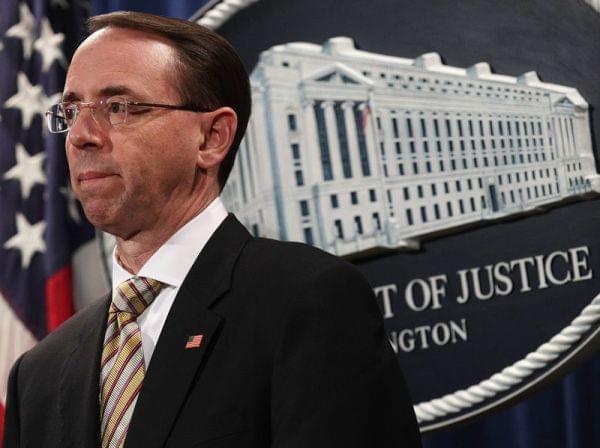Justice Department Charges Russian Cyberspies With Attack On 2016 Election

Deputy U.S. Attorney General Rod Rosenstein convened a press conference at the Justice Department on Friday. Alex Wong/Getty Images
The Justice Department charged 12 Russian intelligence officers on Friday with a litany of alleged offenses related to Russia's hacking of the Democratic National Committee's emails, state election systems and other targets in 2016.
Deputy Attorney General Rod Rosenstein, who announced the indictments, said the Russians involved belonged to the military intelligence service GRU. They are accused of a sustained cyberattack against Democratic party targets, including its campaign committee and Hillary Clinton's campaign.
The GRU attackers also targeted state election systems, including both government agencies and their vendors, and stole information about 500,000 American voters.
The attacks were a signature feature of Russia's active measures against the United States; embarrassing emails were passed to Wikileaks, which released them publicly. The GRU also created other ways to pass the material it stole into the public, including a website called DCLeaks and a fake persona called "Guccifer 2.0."
The flood of embarrassing information about the inner workings of the Democratic Party's leadership led to the resignation of then-DNC Chairwoman Debbie Wasserman-Schultz. Later, Clinton's campaign chairman John Podesta also was embarrassed by the release of his emails.
The Russians in the indictment discussed how and when to release material they'd accumulated in order to make the biggest political splash inside the United States, Rosenstein said.
There is no allegation in the indictment that any American participated knowingly in the GRU cyberattacks, Rosenstein said. Justice Department special counsel Robert Mueller is investigating whether anyone in the United States conspired with the Russian attack on the election.
Rosenstein said that responsibility for this prosecution — which is unlikely to go forward in court as Russia is unlikely to extradite the suspects — would pass from Mueller's office to the National Security division of the Justice Department.
He asked Americans to focus not only who was hurt by or benefited politically from the Russian attacks but to unite against foreign influence in the American democratic process.
"In my remarks, I have not identified the victims," Rosenstein said. "When we confront foreign interference in American elections, it is important for us to avoid thinking politically as Republicans or Democrats and instead to think patriotically as Americans. Our response must not depend on who was victimized."
The U.S. intelligence community has concluded, with further verification by the Senate intelligence committee, that Russia's active measures were aimed at hurting Clinton and helping Trump.
Geopolitical implications
Rosenstein's announcement took place just ahead of a planned meeting between President Trump and Russian President Vladimir Putin on Monday in Helsinki. Trump told reporters on his visit to the United Kingdom on Friday that he planned to "ask" Putin about Russia's attack on the election.
Trump has gone back and forth as to what he acknowledges about what took place and cited Russia's official denials about its active measures.
Rosenstein said the announcement of the charges on Friday took place because that was when the special counsel's office had completed its work investigating them and had the ability to present the evidence to a grand jury.
The indictment unsealed on Friday is available here.
Links
- The Russia Investigations: Mueller Indicts The ‘Internet Research Agency’
- House Republicans Release Partisan Memo On Russia Probe
- 3 Ways Trump Or His Allies Might Try To Disrupt The Mueller Russia Probe
- Grand Jury Approves First Charges In Mueller’s Russia Investigation
- Jared Kushner’s Statement To Congress About Russia, Annotated
- Donald Trump Jr.‘s Emails About Meeting With Russian Lawyer, Annotated
- Former FBI Director Comey Testifies about the Russia Investigation, Annotation and Live Video Stream
- Former FBI Director Mueller Appointed Special Counsel To Oversee Russia Probe

